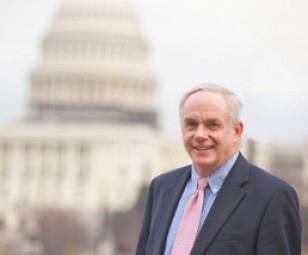Romney’s Upcoming Rough Patch
After winning six of 10 Republican Party presidential primaries on Super Tuesday, Mitt Romney faces perhaps his most difficult stretch on what is turning into a slow slog toward the Republican nomination.

Mitt Romney looks for support in Jackson, Mississippi. Photo: AP
A Massachusetts Yankee trying to win hearts and minds down south in Dixie could get downright awkward if not ugly. The contests in Alabama and Mississippi on Tuesday present real opportunities for Newt Gingrich and Rick Santorum, while Romney has to grin and bear it and hope to win a few delegates before the candidates move on to the next round.
Gingrich in particular has a lot riding on Tuesday. I think he has to win at least one of the two southern primaries outright or the calls for him to quit will become deafening. Winning his home state of Georgia on Super Tuesday was only a ticket to continue for one more week, because if Gingrich can’t spread his brand of conservative cheer to the Deep South, it might be time for him to start another historical novel.

Rick Santorum looks for a helping hand in Alabama. Photo: AP
Santorum also has to deliver to keep his chances alive. He wants to sweep both southern primaries so that conservative Republican leaders can legitimately call on Gingrich to bow out gracefully and let Santorum take on Romney one-one-one.
Romney will hope to salvage something with the Hawaii caucuses, also being held on Tuesday. Then he has to hold on until Illinois on March 20th to restart the bandwagon that goes something like, “Well, it’s going to be Mitt sooner or later so you might as well join now while we are on a semi-roll.”
Because most of the Republican contests reward delegates on a proportional basis, Romney shouldn’t see his delegate lead slip too much. His problem has always been the perception that the party’s conservative base just isn’t enthusiastic about his candidacy, as well as the belief — or hope — that people are eventually going to fall in line behind him because there is no one else.
Super PACS and Delegate Rules Help Extend Republican Race
The Wall Street Journal notes that the so-called Super PACS – privately financed political action groups — behind the Republican candidates spent three times as much money as the candidates themselves in the two week period leading up to Super Tuesday.
The Super PACS are largely an outgrowth of the 2010 Supreme Court decision known as Citizens United in which a 5-4 court majority decided to knock down most legal restrictions that prevented corporations, unions and wealthy individuals from raising money for candidates as long as they did not coordinate their efforts with the official campaigns.

Wife Callista looks on as Newt Gingrich works the crowd in Mississippi. Photo: AP
As a result this year, Newt Gingrich could count on Las Vegas casino magnate Sheldon Adelson and the “Winning Our Future” Super PAC to keep him in the race even when he was doing poorly in the primaries.
Likewise, Rick Santorum has been able to rely on the “Red White and Blue Fund” to keep his campaign afloat during some early rough patches after his victory in Iowa.
The most potent of all has turned out to be the group supporting Mitt Romney, “Restore Our Future,” which has spent more than $30 million on his behalf.
In the past, candidates who went on a losing streak during the primaries generally found their funding dried up, which forced them out of the race. But this year, the role of Super PACS has been a lifeline for candidates in trouble and has allowed them to either keep breathing in terms of fundraising (often Gingrich), or helped them to revive their prospects after setbacks and turn them into a real contender (Santorum).
It should be pointed out, however, that Romney has dwarfed his rivals both in regular campaign fundraising and in Super PAC prowess.
In addition to the money angle, the Republican Party’s move away from winner-take-all delegate allocations from the state contests has really helped to stretch out the race, much as it did for the Democrats in 2008 when Barack Obama eventually outlasted Hillary Clinton.
But a few winner-take-all Republican contests near the end of the primary season could help put Romney close to the goal of securing the 1144 delegates necessary to claim the nomination.
In April Romney will have winner-take-all opportunities in Maryland, Wisconsin, Washington D.C., and Delaware. And near the end of the primary calendar in June, Romney could boost his delegate total with winner-take-all victories in New Jersey and Utah.


3 responses to “The Republican Race Heads South”
[…] Voice of America (blog) […]
[…] overstated?CBS NewsU.S. News & World Report -CBS News -Slate Magazine -Voice of America (blog)all 17,934 news […]
[…] […]